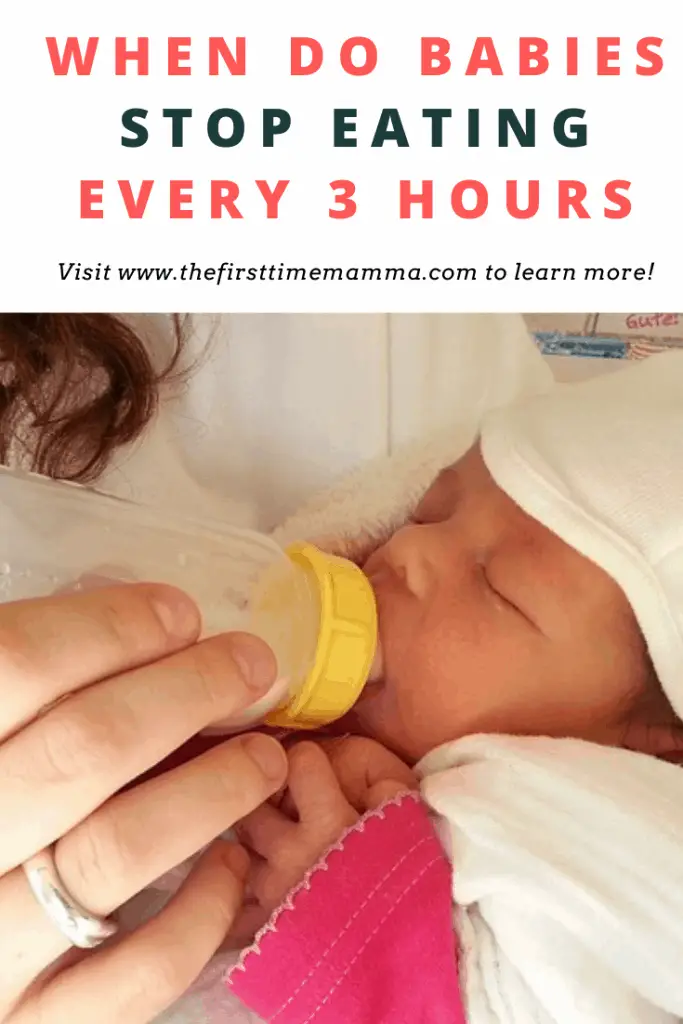It has been two weeks since you’ve had your baby. Your pediatrician has advised you to feed the baby every 2-3 hours. You’ve been busy recovering from childbirth and keeping up with your baby’s strict feeding schedule. You’re getting up every 2-3 hours during the night to make sure your baby doesn’t go too much time without feeding. This can be a little tiresome and make mothers ask – when do babies stop eating every 3 hours? You need not worry too much because this phase is short-lived and there’s light at the end of this small tunnel.
Hey! By the way… any links on this page that lead to products on Amazon are affiliate links and I earn a commission if you make a purchase. Thanks in advance – I really appreciate it! .
Baby only needs to be fed frequently during the first few weeks of their lives. According to research, breastfeeding is crucial for the first six months of the baby’s life. New mothers are often surprised by how often newborn babies need to eat. If your baby acts hungry all the time, it might cause you to wonder if something is wrong. If you’re breastfeeding your baby, then you might see that your baby gets hungry more quickly. This is because breast milk is so good for your baby, that’s why they need to eat so often. Breastmilk is easy to digest, so it doesn’t stay in your baby’s stomach for long. And since your baby’s stomach is so small, they can only eat a little at a time. Though it’s difficult to know when it’s okay to let your baby sleep without waking them every 3 hours for feeding, these signs will help you interpret when your baby can wait longer between the feeds during the night.
- The baby has surpassed their birth weight.
- The baby is gaining weight at a healthy rate.
It is at this point that most mothers relax and allow their babies to feed on demand instead of waking them up every 2-3 hours for feedings. However, there are some exceptions to these rules, and those exceptions include:
- Premature Babies: Some babies tend to go about 4 hours between a feed during the night and it’s okay. Just don’t let them go over 4 hours between a feed. As it increases their risk of sleeping through their hunger.
- Jaundiced Babies: Babies who have jaundice are quite sleepy. Babies with jaundice are also famous for appearing full after a feed when actually they are not. They are also at risk of sleeping through their hunger. That’s why it is advised to wake them up after every 3 hours to feed.
Once your baby has surpassed their birth weight and is gaining weight at a healthy rate which has been approved by your pediatrician, then they won’t have to feed quite frequently. This means that you won’t have to wake your baby up after every three hours, though between 4 and 12 weeks your baby might still wake up on this frequently on their own and want to eat. This totally depends on your baby. Every baby has different feeding habits, some wake up every 4 hours, and some wake up every 5 hours during the night to feed. This variation can also depend on whether your baby is breastfed or formula-fed.
By the age of 3 months, many babies can sleep for at least five hours straight every night without needing to eat. Many can sleep for even longer periods at this age, so you might get lucky and enjoy seven or eight hours of uninterrupted sleep yourself.
Different hunger cues to let you know when a baby is hungry
During the first week, your baby’s tummy slowly grows in size and can hold a larger volume than it did when a baby was born. During this time, your milk will come in and provide your baby with more food during each feeding session. Feed your baby whenever you see early hunger cues, such as when a baby is opening their mouth and turning their head side to side as if they are looking for food, or sucking on their hands. Try not to wait until your baby is crying to feed them. Crying is the very last sign of hunger and a crying baby is very difficult to handle as they are cranky and less patient at learning how to latch on to the breast and this may cause the feedings to be more stressful for you and your baby.
An average feeding lasts about 20 to 40 minutes with some pauses. Leave the baby on the first breast until it is empty, or until your baby lets you know that they are done by coming away from the breast or by falling asleep. The milk that the baby gets at the end of the feeding contains the fat that your baby needs to grow. It also helps the baby to feel full and satisfied after the feeding session. When the baby has finished on the first side, offer the other breast and let your baby finish their feeding on this side. Most babies will feed on both breasts at each feeding. At the next feeding, start with the breast you finished with at the previous feeding so you’re not starting every feeding on the same breast.
So, the points above answered the question – when do babies stop eating every 3 hours. You need to keep the following in mind: if your baby has surpassed their birth weight and is gaining weight at a healthy rate then you can stop feeding them every 2 to 3 hours and start feeding them according to their demand. Premature and jaundiced babies may sleep through their hunger and so baby boys who have had circumcision. That’s why it’s very important to wake them up for feeding. For these babies, you need to check with your pediatrician to let you know when you can start feeding them on demand.
If you’re planning on breastfeeding your baby, then you should try to establish your breastmilk supply first before switching to feeding on demand. In the end, it all depends on your motherly instincts. Trust your gut feeling. If your baby is eating well and thriving, then switch to feeding on demand during the night and enjoy those few hours of blissful, uninterrupted sleep.
There you have it – the answer to the question – when do babies stop eating every 3 hours?

